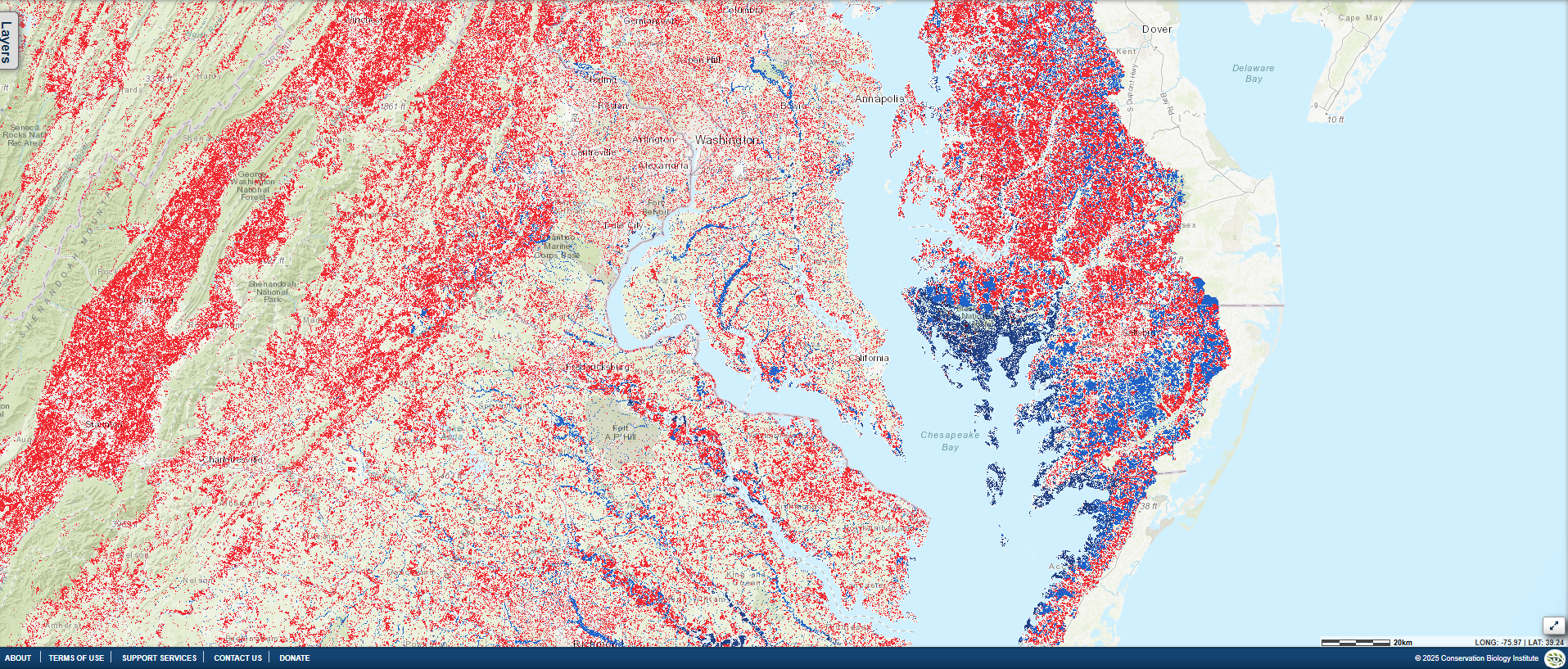The CHESAPEAKE CONSERVANCY is proud to offer its INAUGURAL
Sally S. Kleberg Conservation Data & Policy Fellowship
This fellowship is exclusively available to graduate students enrolled in Duke University’s Nicholas School of the Environment and will be administered through the Chesapeake Conservancy’s on-campus conservation partner, the Park Institute of America.
in partnership with
&
Fellowship Summary
We are seeking one student fellow to will support Chesapeake Innovation Center’s (CIC’s) role in the Chesapeake Bay 30x30 Initiative. The fellow will learn CIC’s approach to data application by developing spatial resources such as biodiversity mapping, wildlife road crossings, wetland mapping, high resolution landcover mapping, and solar siting. The fellow will transform the data into engaging content that informs environmental policy in social, economic, political and cultural areas that protect water quality, wildlife, and our community’s way of life.
Location - REMOTE; optional travel opportunity to visit the Chesapeake Innovation Center and the watershed project area
Duration - 12 weeks with flexible May start date; 40 hours per week
Compensation - $8,000 stipend
Chesapeake Innovation Center Team
The fellow will work directly with the Chesapeake Innovation Center’s team under the supervision of Dr. Mike Evans with additional guidance and professional development provided by CIC Director Emily Beach, Tyler Sammis of the Park Institute of America, and the Chesapeake Conservancy’s partners.
Mike Evans, PhD
Deputy Director, Chesapeake Innovation Center
Emily Beach
Director, Chesapeake Innovation Center
Program Goals
Chesapeake Conservancy Goal - Accelerate progress to conserve 30% of the Chesapeake watershed by 2030 by equitably connecting people to the Chesapeake while conserving and restoring priority lands and waters.
Chesapeake Innovation Center Goal - Transform data into precise and actionable insights that restore and sustain the Bay’s health for current and future generations.
Fellowship Goal - Provide an unmatched conservation experience for Nicholas School graduate students while concurrently expanding the CIC’s geospatial policy resources and establishing a career pipeline in conservation.
Description of Work
This fellowship provides students with a project-based learning experience in geospatial modeling, evidence-based conservation solutions, research, and environmental policy. The fellow will work with the CIC’s Deputy Director and data scientists on various tasks to ensure each project contains necessary and accurate data. The fellow will use GIS software and a controlled editing database environment to edit the spatial and tabular data and will assist in documenting procedures and workflows.
Explore several formats of CIC data communications outputs below.
The Chesapeake Conservancy shares its 30x30 goal for the Bay with partnered organizations like the National Parks Conservation Association (NPCA), as well as sharing NPCA’s approach to conservation data science. Concurrent with the execution of CIC tasks, the fellow will attend weekly virtual labs with the two-fellow cohort from the NPCA Land & Seascape Conservation Fellowship Program (both Nicholas School students.) The purpose of this instructional program is to:
Expand fellows’ science communications skillset
Foster cohesion, collaboration, and information sharing among cohort fellows
Ensure consistency of data management practices
Syllabus - Each week’s instruction will cover a distinct conservation science topic including:
Large Landscape Conservation and Consulting Regional Staff and/or Partners
Sourcing High Quality Data
Building a Database in ArcGIS Online and Metadata
Configuring a Web Application in ArcGIS Online
Landscape Indicators
Science Communication
Science for Policy
Presenting Results to Regions Teams and/or Partners
Science Careers
Separate CIC weekly discussions will focus specifically on the fellow’s project area and the policy aspects of any independent deliverables.
Skills Required
This fellowship includes data analysis and policy components. We are looking for applicants motivated to learn new skills and techniques across data analysis, communications, and policy frontiers. Applicants should be or have:
Familiar with Geography, GIS, Remote Sensing, or other relevant fields
Highly interested in geospatial analysis, environmental policy, and applied science
Highly interested in conservation, landscape ecology, mapping, wildlife, land protection, and/or the Chesapeake Bay 30 by 30 initiative
Collaborative and productive in team settings and when working over video conference and email with partners
Highly productive when working independently and/or remotely
Strong organizational skills and with an eye toward quality control
Desire to grow knowledge base with complementary skills
Application Details
Eligibility - This fellowship is offered exclusively to MEM or MF students enrolled in Duke University’s Nicholas School of the Environment who will continue to pursue their full-time studies in Fall 2025.
The 2025 application period has CLOSED.
Special recognition and appreciation
The Sally S. Kleberg Conservation Data & Policy Fellowship is made possible through the generous contributions of Ms. Sally S. Kleberg, Mr. William Scott Hall, and the Kleberg Conservation Fellowship Fund.










